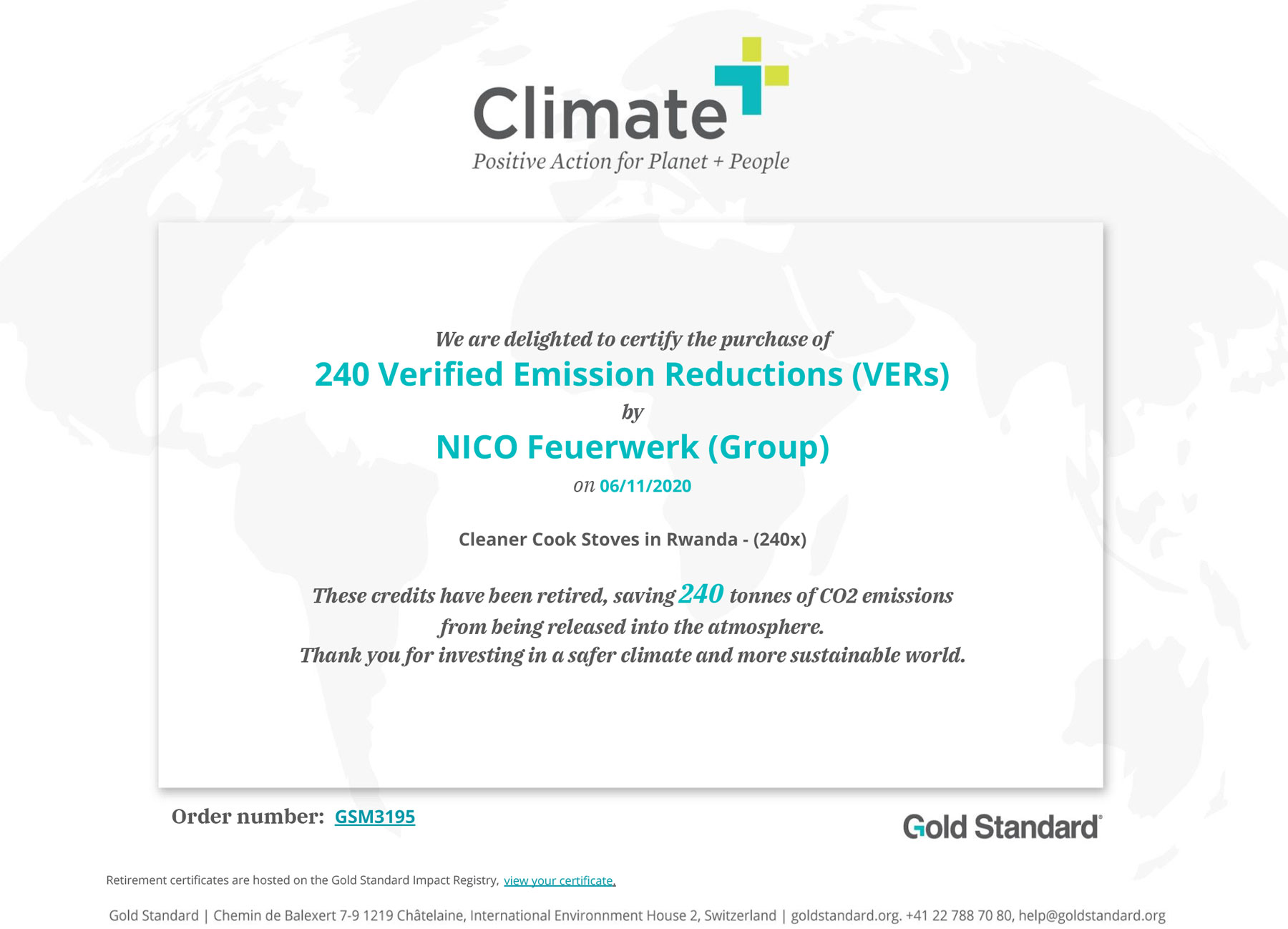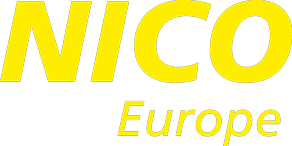CO₂ Compensation
Climate responsibility on our own initiative
Environmental protection is very important to us. As a manufacturing company, we have a special responsibility. We are aware that fireworks produce CO2. After we have already reduced our CO2 emissions by 1. expanding our conference technology, 2. reducing business trips and 3. introducing the “paperless office”, the NICO Group also compensates for all of the CO2 that is released when our fireworks are lit . This applies to all of our products that we put into circulation, as well as to our pyrotechnics, which are used in fireworks all over the world. Every year we calculate the individual CO2 emissions of our sold products and compensate the total CO2 released. Emission compensation is carried out through sustainable projects. All projects are certified by GOLD STANDARD. We want to support every New Year’s fireworks fan in reducing their ecological footprint.
In addition, we offer pyrotechnicians a free service that they can use as an argument when acquiring orders if they use our pyrotechnics for their shows. In the period 2019/2020 (New Year’s Eve fireworks included), we offset 240 tons of CO2, which corresponds to around 19,200 trees. (A tree binds around 12.5 kilos of CO2 Source: https://www.co2online.de/).
Note:
The principle of (CO2) compensation is based on the idea that it is not decisive for the climate where greenhouse gases are emitted or avoided. Therefore, emissions caused at one point can also be saved at a distant point. Since avoiding emissions yourself is always preferable to compensating later, voluntary compensation should be the last step after avoiding and reducing.
Source: https://www.umweltbundesamt.de

Whats the Gold standard?

The Gold Standard is the world’s strictest certification standard and only certifies climate protection projects that meet the highest requirements.
Here, in addition to the additionality of the climate protection projects, numerous other criteria must be met to ensure sustainable development in the countries in which the projects are implemented. The Gold Standard certifies both climate protection projects that lead to emission reductions traded on commitment markets (see CDM Gold Standard), as well as those for voluntary markets. It is important that CO2 certificates are certified by recognized institutions, for example VCS, Gold Standard, BUND, CarbonFix, CCB Standards, DFG-Energy and others. Only then is it guaranteed that the certificates actually originate from effective climate protection projects and are not sold multiple times. The certificates transferred in this way are then permanently set aside (Source Wikipedia).
Umweltbundesamt on the „Gold Standard“ seal:
“Look out for this certification when it comes to compensation providers. The Gold Standard Foundation is a non-profit certification organization registered in Switzerland. Only projects that demonstrably lead to the reduction of greenhouse gases and at the same time are good for the local environment and social concerns of the population are eligible for certification by “The Gold Standard”.
Source: www.umweltbundesamt.de
Quarks (science info website) on the “Gold Standard” seal:
“The Gold Standard is a special kind of seal of quality. Projects of this standard not only make a contribution to climate protection, but also to at least one of the 17 sustainability goals of the United Nations – which should lead to a decent life worldwide and protect the environment permanently”.
Source: www.quarks.de
Our climate protection project for CO2 compensation
We support the "Oven Project"
In many African countries, wood and coal are the most important sources of energy. It is particularly important to meet the growing demand for these two resources without cutting down more trees than can grow back in the same period. Trees store carbon and relieve the atmosphere. The long-term binding of carbon in the forests is subject to risks such as forest fires and thus the release of CO2. We also support organizations that greatly improve energy efficiency on the consumer side. This also leads to cost savings, which benefit the poorest.
Why we support the "oven project"
The people of Ruana usually use an open fire in their small huts for cooking. This means those indoors are exposed to soot and noxious fumes. It is mainly women and children who traditionally take care of the housework. When cooking, a lot of wood is used. The new stoves help to get more energy from less wood. You use a lot less wood. The little huts are no longer full of smoke. The stoves mean better health, more time for people to pursue education, a sideline, or traditions.
“I have experienced first hand during a trip to Ghana in Kumasi, Accra or in the countryside what a waste of resources and what a waste of time, preparing simple meals or boiling water to make it more drinkable with the usual wood stoves means for the people there. The nearby forests are cut down and the smoke in the small huts burns the eyes and damages the lungs. Starting right here is a great idea.”
– Nicolas Kandler (NICO product development)




